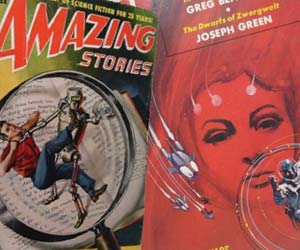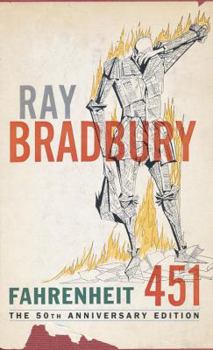Fahrenheit 451: The Temperature at Which Book Paper Catches Fire, and Burns
Select Format
Select Condition 
Book Overview
Nearly seventy years after its original publication, Ray Bradbury's internationally acclaimed novel Fahrenheit 451 stands as a classic of world literature set in a bleak, dystopian future. Today its... This description may be from another edition of this product.
Customer Reviews
Adored, will be reading again
Very bad customer care- Wrong version shipped. Can’t even touch this book. Disgusting
People who doodle in books and write notes in them are annoying.
Wow-- must read
In tatters
I got a completely different book!
LOTS of Sharpie
Must Have For Your Collection
A book that, ironically, might end up getting burned up some day.
A Classic
Well worth a read
Loved it!
Read This Book
Great Book!
Tbh
Unacceptable quality from seller.
Good Book on Censorship
Terrible.
Can't Get Into It
Collective loss of memory, history, and the outside world
Fahrenheit 451 Audiobook
farenheit 451- a readers response
Bradbury's classic parable on the evils of censorship
Fiction? Really?
Fahrenheit 451 Mentions in Our Blog

In 1926 the launch of Amazing Stories introduced a new genre of science fiction in the form of a pulp magazine. Writers like Robert Heinlein, Isaac Asimov, and even Stephen King began their careers in magazines like these. Let's take a brief look at some of the trend-setting pulp science fiction magazines which are well remembered, and highly valued, today.

Here at Thriftbooks, many of us identify as book lovers. But, obviously, we don’t love all books equally. In fact, most of us gravitate toward a favorite genre or two. Does what you read say something about who you are? Read on to see what your favorite genre might reveal about you.

The 16th Annual Friends of the Libraries Week is October 17–23, 2021. This kicks off another year to show appreciation and recognition to the Friends. Their daily volunteer work helps fund our libraries, keeping them alive and their doors open to readers. ThriftBooks creates a circle with the Friends groups; we help them sell their books resulting in increased library funding.

We can't go to any actual beer fests this year, but we can imagine the ideal scene. And, of course, it would be filled with some of our favorite beer-loving authors from history. While we're at it, let’s throw in a few of their iconic characters. Join us on fantasy dates with five authors who found inspiration while imbibing.

On the eve of what would have been Ray Bradbury's 99th birthday, we celebrate the prolific author who passed away in 2012. A largely self-educated man, Bradbury wrote more than 30 books and close to 600 short stories.







